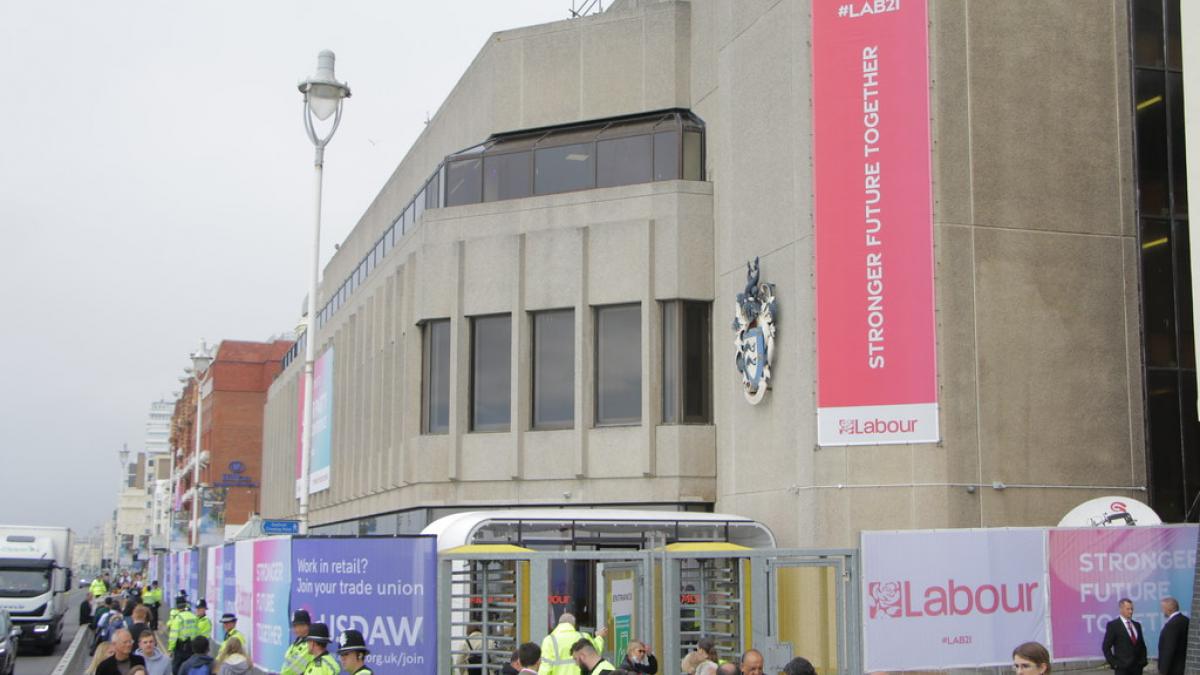 After a pandemic-induced hiatus, the IFoA’s Public Affairs team returned to the party conference circuit this year, attending both the Labour and Conservative conferences in Brighton and Manchester respectively. IFoA Head of Public Affairs Henry Thompson reflects on the developments of the past fortnight and the value in the team having ‘boots on the ground’ at these events.
After a pandemic-induced hiatus, the IFoA’s Public Affairs team returned to the party conference circuit this year, attending both the Labour and Conservative conferences in Brighton and Manchester respectively. IFoA Head of Public Affairs Henry Thompson reflects on the developments of the past fortnight and the value in the team having ‘boots on the ground’ at these events.
The mood around the first few days of Labour’s conference was very much like the weather that greeted us in Brighton: stormy. A raft of governance changes to the party apparatus – instigated by the leadership – sparked outrage on the Left and put paid to any feelings of party unity as media lenses turned to the south coast. The resignation of a Shadow Minister on the issue of the national minimum wage on the eve of Sir Keir Starmer’s big speech won’t have helped either. The results of the vote mean that Labour is no longer a member-led party, with power in the hands of the unions and MPs. Starmer was able to successfully navigate his first leader’s speech to the conference, despite the efforts of hecklers, who were out-heckled by Starmer himself. On the fringes, there were clear attempts by the Shadow Cabinet to demonstrate their seriousness and competence, as well as their links with business and the private sector. Notable mentions go to the Shadow Chancellor Rachel Reeves whose stock will have risen following her well-received speech and announcements on the removal of business rates and a £28bn per annum injection to support the green transition. After a difficult few years, conversations in the margins suggested the feeling within the party is somewhat optimistic as Labour slowly finds its feet again.
The weather in Manchester wasn’t that much better but the mood among members certainly was, reflected in the upbeat closing speech by the Prime Minister on Wednesday. In amongst the chunks of red rhetoric meat tossed to the party faithful, there was little, if anything, in the way of ‘new’ policy. Johnson and his Cabinet colleagues may be forgiven for the dearth of policy announcements, as over the coming weeks, the Budget, the three-year Spending Review, the Levelling Up Plan and the Net Zero Plan (to name a few) are all expected. Yet for all the bonhomie in the conference hall, concerns around rising gas prices, fuel shortages and supply chain disruption that are all currently circling the country will sit uncomfortably in some ministers’ minds. Some may worry about the potential disconnect between the rosy view of the future painted by the PM and the challenges facing certain sectors and parts of the country. The size of Johnson’s parliamentary majority should not be forgotten; this is a Prime Minister with a considerable grip on power, with support within the party to match. But choppy seas may lie ahead.
This year, the IFoA partnered with the Social Market Foundation (SMF) to host a fringe event at each conference. The event at Labour allowed us to showcase the recently published ‘The Hidden Risks of Being Poor’ report, which considers the poverty premium in insurance. Hilary Salt (First Actuarial) was joined on the panel by Martin Coppack (Fair By Design) and Marina Ahmed (London Assembly Labour Group Spokesperson for the Economy), with James Kirkup (SMF) in the chair. In Manchester for the Conservatives, we opted to major on ‘The Great Risk Transfer’ campaign and how to ensure retirees make the best of the financial freedoms afforded by the 2015 reforms to pensions. Hilary again joined the panel alongside James as chair to speak alongside Nigel Mills MP (Work and Pensions Select Committee Member) and Peter Tutton (StepChange). Both events were well attended and demonstrated the relevance of the IFoA’s policy work to the live political discourse happening within the major parties, as well as the joint desire among other stakeholders to make markets work better for consumers. You can re-watch our events at Labour here and the Conservatives here.
When surveying the fringe listings in each of the conference guides, it was noticeable how many climate-related sessions were being run in both Brighton and Manchester. Even in 2019 - the last time these conferences were hosted in person - one would have been hard-pressed to find a handful of ‘green’ events. The topic of the environment and achieving Net Zero dominated both conferences and there was a consensus amongst members and business groups alike that there is a need for a greater long term plan from the Government. The increasing fervour around COP26 in Glasgow is clearly having an effect on how high climate is on the political agenda. This interest now needs to turn into tangible action.
The party conferences provide a unique opportunity to engage with multiple parliamentarians and stakeholders on the IFoA’s policy priorities in one place and this year’s events felt all the more important given the lack of face-to-face engagement over the last 18 months. Whilst initially it did feel a little strange being packed into small conference rooms with dozens of other conference-goers, it demonstrated the value of in-person engagement with parliamentarians, party members and the wider stakeholder ecosystem in attendance. It enabled us to foster new (and cement existing) relationships, build the IFoA’s reputation as a trusted voice, and increase awareness of actuaries’ expertise on some of society’s biggest challenges.